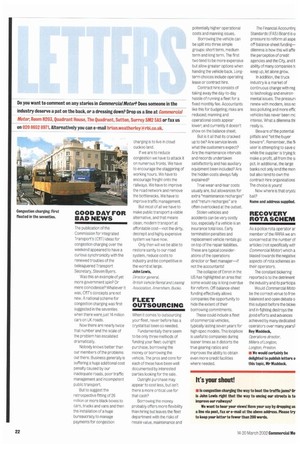FLEET OUTSOURCING
Page 22

If you've noticed an error in this article please click here to report it so we can fix it.
When it comes to outsourcing your fleet, never before has a crystal ball been so needed.
Fundamentally there seem lobe only three methods of funding your fleet: outright purchase, borrowing the money or borrowing the vehicle. The pros and cons for each of these have been well documented by interested parties looking for the sale.
Outright purchase may appear to cost less, but isn't there a more critical use for that cash?
Borrowing the money probably offers more flexibility than hiring but leaves the fleet department with the risks of resale value, maintenance and potentially higher operational costs and manning issues.
Borrowing the vehicle can be split into three simple groups: short term, medium term and long term. The first two tend to be more expensive but allow greater options when handing the vehicle back. Longterm choices include operating lease or contract hire.
Contract hire consists of taking away the day-to-day hassle of running a fleet for a fixed monthly fee. Accountants like this for budgeting; risks are reduced; manning and operational costs appear lower; and currently it doesn't show on the balance sheet.
But is it all that its cracked up to be? Are service levels what the customers expect? Are the maintenance intervals and records undertaken satisfactorily and has auxiliary equipment been included? Are the hidden costs always fully explained?
True wear-and-tear costs usually are, but allowances for extra "maintenance recharges" and "return recharges" are often overlooked at the outset.
Stolen vehicles and accidents can be very costly too, especially if a vehicle is an insurance total loss. Early termination penalties and replacement vehicle rentals go on top of the repair liabilities. These are typical considerations of the operations director or fleet manager—if not the accountants!
The collapse of Enron in the US has highlighted an area that some would say is long overdue for reform. Off-balance-sheet funding effectively allows companies the opportunity to hide the extent of their borrowing commitments.
These could include a fleet of commercial vehicles, typically lasting seven years for high-spec models. This loophole is useful to companies during leaner times as it distorts the true gearing ratios and improves the ability to obtain even more credit facilities where needed.
The Financial Accountini Standards (FAS) Board is u pressure to reform all aspe off-balance-sheet funding— dilemma is how this will affe the perception of credit agencies and the City, and t ability of many companies t( keep up, let alone grow.
In addition, the truck industry is a market of continuous change with reg to technology and environmental issues. The pressuri renew with modern, less no less polluting and more effic vehicles has never been mc intense. What a dilemma thi really is.
Beware of the potential pitfalls and "let the buyer beware". Remember, the II user is attempting to save c while the supplier is trying ti make a profit, all from the s pot. In additional, the large banks not only lend the mon but also tend to own the contract-hire organisations The choice is yours!
Now where is that crysti• ha1r,
Name and address supplied.
















































































































































